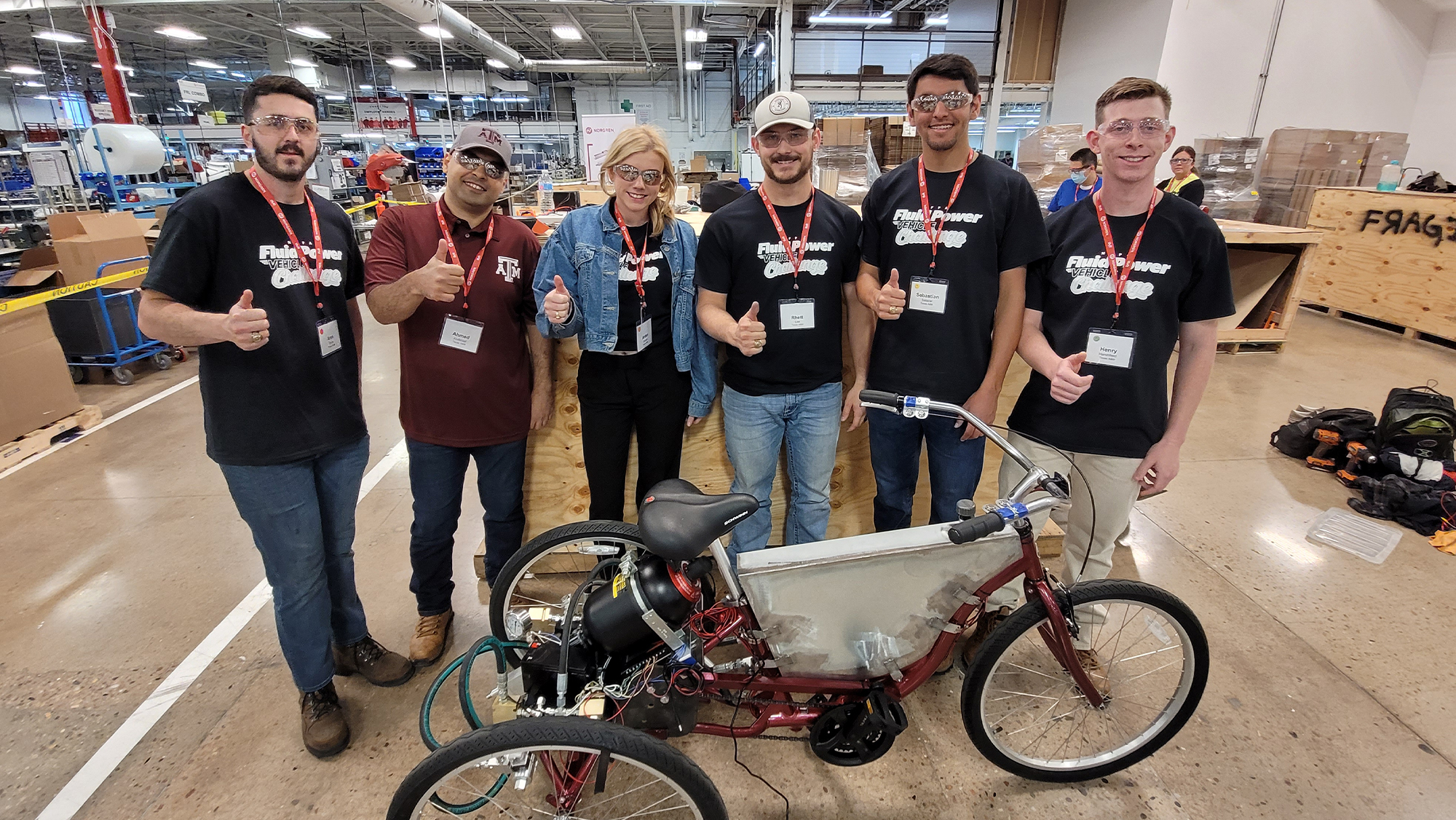
Inside the Norgren facility, Dr. Ahmed Abdelaal (second from left) stands with the Aggie team and the tricycle they competed with in the Fluid Power Vehicle Challenge. Norgren is one of the largest suppliers of fluid power technologies in the world. From left: Aren Davis, Abdelaal, Arden Sinclair, Rhett Lee, Sebastian Salazar and Henry Harshfield. |
Image: Courtesy of Dr. Ahmed Abdelaal
Five students from the Department of Engineering Technology and Industrial Distribution at Texas A&M University won the Judge's Choice–Teamwork award at the 2022 Fluid Power Vehicle Challenge organized and sponsored by the National Fluid Power Association (NFPA) to design and manufacture a bike that can operate using fluid power.
The NFPA Fluid Power Vehicle Challenge promotes original thinking in a competitive setting by combining two technology platforms that are not generally associated with one another — human-powered vehicles and fluid power (hydraulics and pneumatics).
For nine months under the supervision of Dr. Ahmed Abdelaal, the students — Rhett Lee, Aren Davis, Henry Harshfield, Arden Sinclair and Sebastian Salazar — designed hydraulic circuits and fabricated different brackets that were attached to a tricycle.
"The goal of the competition is to create opportunities for motivated students to join the fluid power industry," Abdelaal said. "The team first went through a midterm review where they presented their design to a panel of judges and were selected to participate in the final competition in Littleton, Colorado."
"Our award shows that nobody was left behind," Lee said. "At the beginning of our project, we sat down as a team to talk about our strengths and weaknesses and assigned roles based on our discussion."
"Everyone was held accountable," Davis said. "We were cheering and being encouraging to each other. If fixing a part of the bike was a one-person job, the rest of us were present while it was repaired."
The Aggies played it safe with a tricycle for its stability and to focus on optimizing the components of their hydraulic system.
"Being able to turn an idea into a tangible item helped me experience all phases of a project," Sinclair said. "This helped me learn the importance of planning, budgeting and assessing risks with various tasks. It helped me connect the engineering side of things to the overall scheme of a project and how each process affects another."
"Working together isn't just about ensuring the work is equally balanced," Harshfield said. "Teamwork is about hearing opposing ideas, taking a logical route to determine the best action plan and respecting everyone's perspective through the entire process."
"The competition was an excellent opportunity that allowed the students to connect all the theories they learned in the classrooms to real applications," Abdelaal said. "The team would like to give a special thanks to the NFPA and Brian Tritle and Kensey Sydness from Iowa Fluid Power for their technical guidance as industry mentors for the team."
"I'm grateful I had an opportunity to compete," Salazar said. "Hard work pays off, and I wish all the best to the team who goes out to represent Texas A&M University at the competition in April 2023."
The NFPA Fluid Power Vehicle Challenge promotes original thinking in a competitive setting by combining two technology platforms that are not generally associated with one another — human-powered vehicles and fluid power (hydraulics and pneumatics).
For nine months under the supervision of Dr. Ahmed Abdelaal, the students — Rhett Lee, Aren Davis, Henry Harshfield, Arden Sinclair and Sebastian Salazar — designed hydraulic circuits and fabricated different brackets that were attached to a tricycle.
"The goal of the competition is to create opportunities for motivated students to join the fluid power industry," Abdelaal said. "The team first went through a midterm review where they presented their design to a panel of judges and were selected to participate in the final competition in Littleton, Colorado."
"Our award shows that nobody was left behind," Lee said. "At the beginning of our project, we sat down as a team to talk about our strengths and weaknesses and assigned roles based on our discussion."
"Everyone was held accountable," Davis said. "We were cheering and being encouraging to each other. If fixing a part of the bike was a one-person job, the rest of us were present while it was repaired."
The Aggies played it safe with a tricycle for its stability and to focus on optimizing the components of their hydraulic system.
"Being able to turn an idea into a tangible item helped me experience all phases of a project," Sinclair said. "This helped me learn the importance of planning, budgeting and assessing risks with various tasks. It helped me connect the engineering side of things to the overall scheme of a project and how each process affects another."
"Working together isn't just about ensuring the work is equally balanced," Harshfield said. "Teamwork is about hearing opposing ideas, taking a logical route to determine the best action plan and respecting everyone's perspective through the entire process."
"The competition was an excellent opportunity that allowed the students to connect all the theories they learned in the classrooms to real applications," Abdelaal said. "The team would like to give a special thanks to the NFPA and Brian Tritle and Kensey Sydness from Iowa Fluid Power for their technical guidance as industry mentors for the team."
"I'm grateful I had an opportunity to compete," Salazar said. "Hard work pays off, and I wish all the best to the team who goes out to represent Texas A&M University at the competition in April 2023."